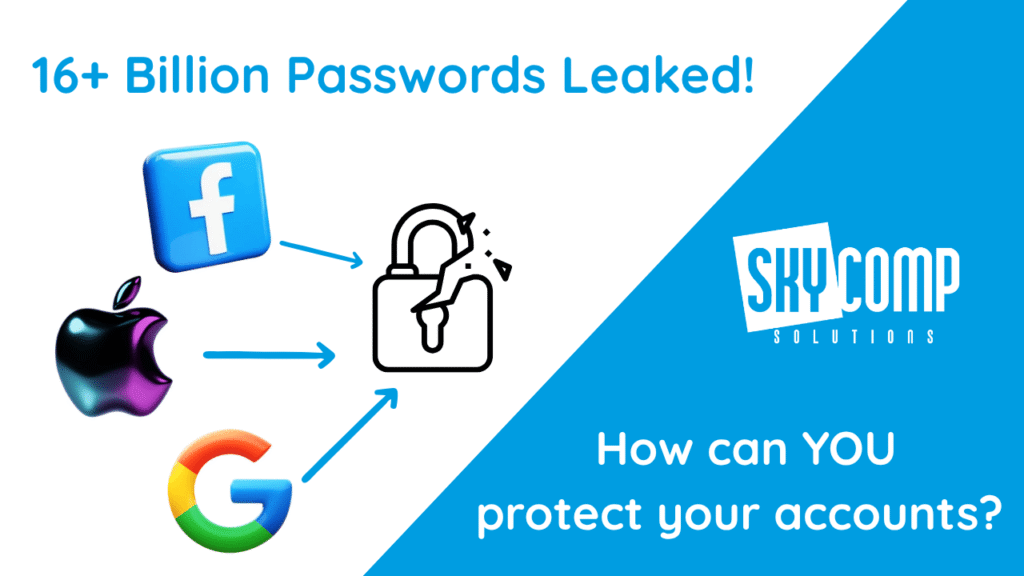Cybersecurity threats are constantly evolving, but this one is massive—even by today’s standards.
At Skycomp Solutions, we keep a close watch on cybersecurity developments, and this is one of the largest credential leaks we’ve seen in years: Over 16 billion login credentials—including active accounts from Apple, Google, Facebook, and even government services—have been exposed online.
This isn’t a recycled leak from years past. These are fresh, currently active credentials. And yes—it could affect you or your business.
Let’s break it down.
What Happened in This Credential Leak?
Cybersecurity researchers recently uncovered 30 separate datasets shared online, containing over 16 billion username and password combinations.
These credentials were likely gathered through info-stealing malware that silently grabs saved logins from infected devices—PCs, laptops, and even browser autofill systems.
Each exposed entry includes:
The login URL (e.g., login pages for Apple, Microsoft, Facebook, banking, etc.)
The actual working username and password combo
Even more alarming? The data only appeared online briefly—just long enough to be copied and shared before disappearing. It’s unclear who posted the data, but the damage is already done.
Why This Matters to You
This isn’t just another headline. It’s a critical threat to both personal and business security.
Leaks like this can result in:
Credential stuffing attacks – where hackers use leaked logins to break into other sites
Phishing attempts tailored to your login history
Identity theft, fraud, and unauthorized financial access
Business Email Compromise (BEC) or corporate breaches if shared passwords are in use
And remember—these credentials are active. Not old. Not expired. That makes them incredibly valuable to cybercriminals.
Here’s What You Should Do Right Now
To protect yourself (and your organization), take these actions immediately:
Change Your Passwords
Start with your most sensitive accounts: email, banking, social media, and work logins. If you’ve reused passwords—change those too.Use a Password Manager
Let’s face it—no one can remember 100+ unique logins. A password manager helps you create and store strong, unguessable passwords for each account.Enable Multi-Factor Authentication (MFA)
Use an authenticator app or passkeys instead of SMS-based codes, which are more vulnerable to SIM swap attacks.Watch for Phishing Scams
If you weren’t expecting the message, don’t click. Phishing emails and texts often follow these leaks, pretending to be from companies like Google or Microsoft.Monitor for Suspicious Activity
Keep an eye on login notifications, password reset emails, or unusual account behavior. If something feels off—it probably is.Use Passkeys Where Available
Google, Apple, and others now support passkeys—a stronger, phishing-resistant login method. It’s time to make the switch if you can.Consider Dark Web Monitoring Tools
Tools like Have I Been Pwned or paid breach monitoring services can alert you if your email or credentials appear in future leaks.
A Quick Reminder From Our Cybersecurity Team
Leaks like this don’t always result in immediate hacks. Often, cybercriminals will wait, study, and target. They’ll craft believable phishing emails, spoof real brands, and try to catch you off guard.
Stay alert.
If a message, login page, or prompt seems suspicious—don’t act on it. Reach out to IT or verify it through official channels.
At Skycomp, our mission is to keep your data safe, your team educated, and your business protected.
This breach is serious—but you can stay ahead of it with the right habits:
Use strong, unique passwords
Enable multi-factor authentication
Stay informed, and stay cautious
And if you’re ever unsure? That’s what we’re here for.
Need help auditing your password policies or rolling out MFA company-wide?
Get in touch with our cybersecurity team today.
Let’s lock things down—before someone else logs in.
